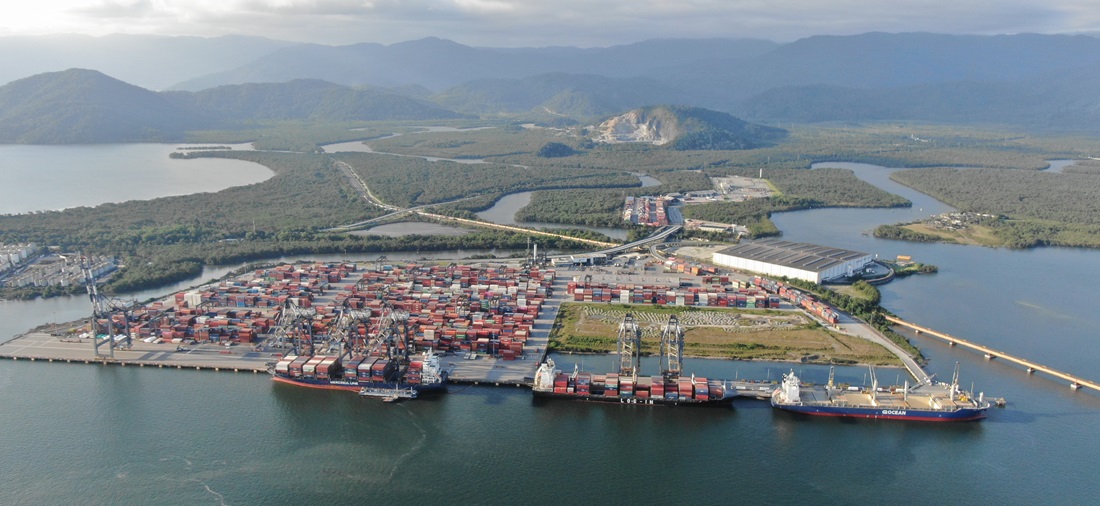
Private Stakeholders Demand Santos Port Authority Autonomy Under New Ports Law
Apr, 25, 2024 Posted by Gabriel MalheirosWeek 202417
Port sector stakeholders have united in a coalition and collectively presented suggestions for the amendment of Ports Law 12,815/2013, during a public hearing conducted by the Commission of Jurists for the Legal Review of the Exploitation of Ports and Port Facilities (Ceportos) on the 24th, hosted by the Santos Commercial Association (ACS). Their primary goal is to secure full autonomy for the Santos Port Authority (APS) through the new legislation.
Chaired by Douglas Alencar, the president of Ceportos and a judge of the Superior Labor Court (TST), the hearing also featured Celso Ricardo Peel Furtado de Oliveira, the general rapporteur and a judge of the Regional Labor Court of the 2nd Region.
The coalition includes prominent entities such as the Brazilian Association of Terminals and Bonded Enclosures (Abtra), the Brazilian Association of Port Terminals (ABTP), the Association of Private Port Terminals (ATP), the Brazilian Association of Liquid Terminals (ABTL), the Brazilian Association of Container Terminals (Abratec), and the Brazilian Association of Cabotage Shipowners (Abac).
Collectively, these associations advocate for decentralizing APS powers from the Union, reinstating the deliberative Port Authority Council (CAP), promoting economic freedom, consulting and conducting public hearings before modifying the Port of Santos polygon and exempting private companies from public announcements and the obligation of maintaining public notices.
“In essence, these are the five premises that we defend together with the coalition,” stated Angelino Caputo, Abtra’s executive director.
Caio Morel, Abratec’s executive director, emphasized, “It doesn’t make sense that a port complex like Santos, with more than 80 lease contracts, has to go to Brasília for each negotiation.”
Jesualdo da Silva, president of ABTP, highlighted the need for simplifying the leasing process at ports.
Rafaela Rocha, a legal advisor for ATP, stressed the importance of reversing the lack of acquired rights of companies post-contract formalization by revising Article 47 of Law 10,233/2001, to provide investors with greater security.
Carlos Kopitke, president of ABTL’s Executive Board, called for special attention to regulatory and legal stability to ensure predictability in contracts, a sentiment echoed by Luis Fernando Resano, executive director of Abac.
Independent port workers staged a protest outside ACS against the abolition of exclusivity in labor scheduling, advocated by the employer sector. Bruno dos Santos, president of the Dockworkers Union (Sindestiva), expressed concern over potential rights erosion and vowed to halt port operations nationwide if necessary.
The final report is scheduled for August, with the possibility of an extension. Rodrigues, the president of Ceportos, affirmed that each subcommittee would draft proposals, which would be consolidated into a general report for further discussion and voting before submission to the House’s president, Arthur Lira.
Opportunity
The revision of Law 12,815 from 2013 presents a vital opportunity to address the evolving needs of the port sector, a crucial component of the Brazilian economy, according to the TST minister. He underscores the importance of ensuring that all stakeholders in the port industry, including workers, shipowners, and public management, have their voices heard in the process.
“Over the course of five meetings of the special committee, our aim has been to gather input from all relevant actors within the port sector. Our objective is to propose a revised text for Law 12,815 that can deliver the advancements necessary to enhance various aspects of port operations,” he explains.
Rodrigues emphasizes the existence of regulatory hurdles that hinder investments aimed at expanding economic activities. “We must address issues surrounding concession and leasing processes, as well as the temporary use of port facilities, always with the overarching goal of maximizing efficiency in the private sector’s operations, while ensuring the public interest is upheld,” he concludes.
Source: A Tribuna
Click here to read the original story report: https://www.atribuna.com.br/noticias/portomar/setor-privado-pede-autonomia-para-a-autoridade-portuaria-de-santos-em-lei-dos-portos
-
Ports and Terminals
Nov, 27, 2024
0
Ports in Brazil’s Paraná throughput total 57M tons between January and October 2024
-
Meat
Sep, 23, 2022
0
China remains firm as Brazil’s main beef buyer
-
Trade Regulations
Aug, 26, 2019
0
Mercosur and Efta conclude negotiations for free trade agreement
-
Ports and Terminals
Apr, 28, 2022
0
Paranaguá port terminals are granted international certificates



